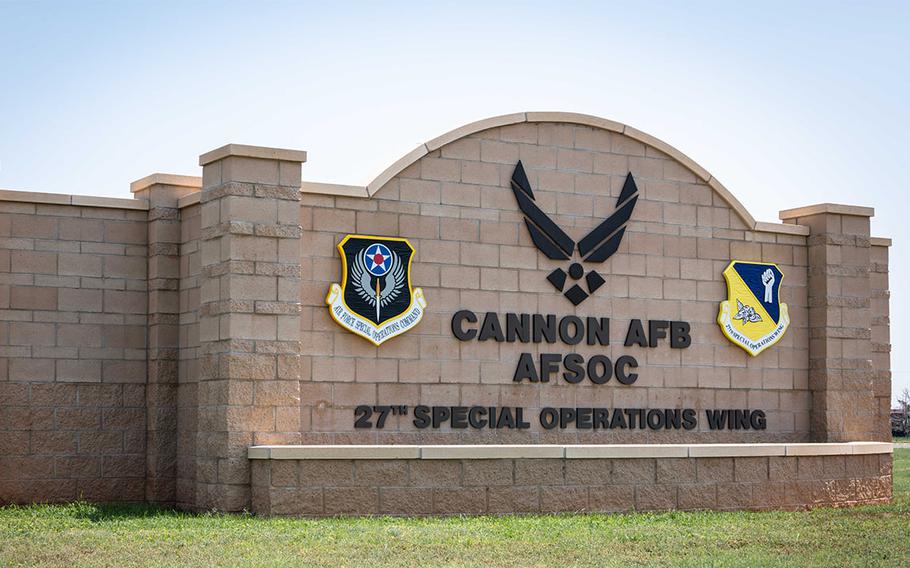
The Air Force is reviewing whether children living at Cannon Air Force Base are more likely to develop a rare brain tumor after three cases were diagnosed at the New Mexico installation in the past 13 years, the service said. (Cannon Air Force Base/Facebook)
The Air Force is reviewing whether children living at Cannon Air Force Base are more likely to develop a rare brain tumor after three cases were diagnosed at the New Mexico installation in the past 13 years, the service said.
Base leaders became aware in September 2022 of a potential cluster of cancer known as Diffuse Midline Glioma/Diffuse Intrinsic Pontine Glioma, or DMG/DIPG. The Epidemiology Consult Service at the Air Force School of Aerospace Medicine began an assessment in January of occurrences at Cannon and is expected to collect the necessary data for the study by the end of the year.
“Your concerns are our concerns,” Col. Brent Greer, deputy commander of the 27th Special Operations Wing, which is headquartered at the base, said in a news release about the research. “We appreciate your patience as we continue gathering and assessing data to provide you the most complete information we can. Our number one priority is the health and safety of our air commandos and their families, and we take the responsibility to investigate these risks to health very seriously. Our hearts continue to be with the families who have lost loved ones to DMG/DIPG cancer or are currently facing childhood cancer of any kind.”
The children’s diagnoses came to light through a private spouses Facebook group, said Jozlin Molette, spokeswoman for the 27th Special Operations Wing. Base leaders felt the topic warranted attention and worked with the School of Aerospace Medicine to initiate the study.
The American Cancer Society described a cluster as a greater-than-expected number of cancer cases within a group of people in a defined geographic region over a specific time. The cancers do not have to have a common cause, and clusters can occur by chance, according to the nonprofit.
Because DMG/DIPG cancers are so rare, the study has been expanded to include the diagnosis rate of all forms of pediatric brain cancer. The Air Force said it’s consulting on its study with the Brain Tumor Center at Cincinnati Children’s Hospital — leading experts on these tumors. It’s also consulting with the New Mexico Department of Health to gather rates of pediatric cancer in the surrounding civilian population.
Cannon, which hosts Air Force special operations, is located near the city of Clovis near New Mexico’s border with Texas. It supports roughly 7,800 military personnel, civilian employees and their families, according to the base. Aircraft assigned to the base include the AC-130J Ghostrider, MC-130J Commando II, CV-22 B Osprey, U-28A Draco and the MQ-9 Reaper.
Only about 300 children in the U.S. are diagnosed with DMG/DIPG each year and there is no known cause behind its formation, said Dr. Pete de Blank, co-medical director of Cincinnati Children’s Brain Tumor Center.
“It seems like horrible luck,” he said. “We don’t really have a great idea of what sort of thing can cause DIPG.”
Doctors have not had success using chemotherapy on the tumors, but instead must take a radiation approach to slow the growth. The average survival rate for children diagnosed with these tumors is about 11 months, de Blank said.
He said he’s grateful for studies such as the one at Cannon that can possibly help find what causes these cancers to form. More information can help lead to better treatment and outcomes for future patients, he said.
At Cannon, three children were diagnosed with DMG/DIPG since 2010, the Air Force said. There were eight years during that time when zero cases were diagnosed. So far, no parallels have been found among the children, such as parents’ occupation or length of time on the base prior to diagnosis.
While parents might want to feel protective of children and look for behaviors to change and prevent illness, de Blank said he doesn’t really see any reason to do that here.
“I don’t see anything that makes me feel like something is causing these tumors,” he said.